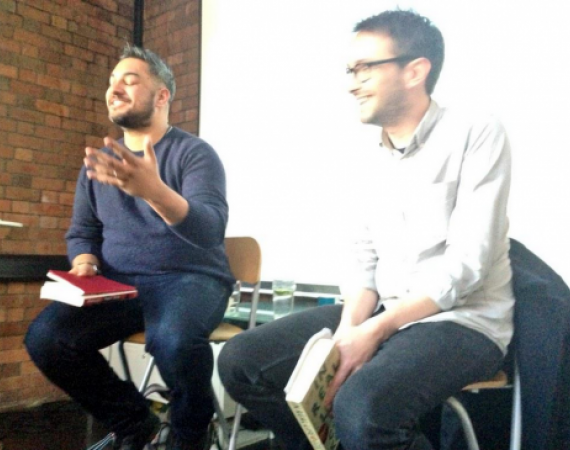Lunchtime talk write-up
Posted on Wed 18 Feb 2015
How to Write About Social Media - A few things I took away from Nikesh Shukla and Chris Killen's Lunchtime Talk.
At the end of January we were joined by authors Nikesh Shukla and Chris Killen, who share a talent for describing the frailties of living life by social media ephemera. They both read from their latest books, Meatspace and In Real Life, and then discussed the relevance of the 21st Century novel and…

Nikesh and Chris - Photo @veritmcintosh
Posted by

Jasmine Butt
Jasmine is a musician, synth builder and AV artist who is currently exploring modular synthesis.At the end of January we were joined by authors Nikesh Shukla and Chris Killen, who share a talent for describing the frailties of living life by social media ephemera. They both read from their latest books, Meatspace and In Real Life, and then discussed the relevance of the 21st Century novel and how to approach writing about the internet. Footage of a tandoori lamb chop rising slowly into space (from Nikesh’s promotional Meatspace video) set a surreal backdrop to their conversation. Here are a few things I took away from the talk.
We have to be honest about the way most of us live today - The UK is good at historical fiction, but whenever a state-of-the-nation TV series comes out, Nikesh feels that it never quite reflects the world we live in. We don’t see people self-Googling, agonising over the wording of a tweet or ‘air-scrolling’ an imaginary phone out of habit... Chris told us that he used to avoid writing about emails and tweets as he was worried that it read too mechanically. After trying to ignore the topic for a long time, he gave in. ‘It was unavoidable... 40% of my time is spent online.’
Meatspace and In Real Life both examine questions of identity that are dredged-up by a culture of endless self-profiling. ‘When we go online, we curate the best possible version of ourselves.’ Nikesh is interested in the impact that our online personas have on our lives offline and whether we try to imitate our static, digital selves in the ‘Meatspace’ (a word derived from William Gibson’s cyberpunk prophecies).
Drawing a line in the sand - Nikesh and Chris are often asked whether they are worried that their books will outdate instantly, as the online platforms they write about haven’t been around for long and will probably be soon be replaced. Nikesh’s made the point that Jane Austen’s novels are full of letter writing, which is probably the most out-dated form of communication we know, yet we still feel that her work is relevant. Chris said he has come round to the idea of a period piece about not very long ago, and after constantly updating the references in his book as he wrote, he felt a huge sense of relief when he finally cast his novel in 2014.
Why a novel? Given that Nikesh and Chris both write about the internet, could they not make use of the kind of cross-platform storytelling it offers? Chris answered, “Because I haven’t found an immersive experience that takes you out of your own body the way that a novel does. I want to delete myself and be alive in another person’s brain. I have never got this from a computer game...’ Both writers agree that although their subject matter calls for a new approach to writing, they have to stay true to the novel as a form. ‘An A-Z list of pop culture references can’t be a novel.’ Nikesh wrote two of the 20 Master Plots into his book. As well as wanting to capture the realities of everyday life in 2014, he wanted Meatspace to contain a compelling story arc, containing universal themes of loneliness, identity and family.
The search for validation - Nikesh and Chris both write brilliantly about the search for validation online. They are very aware that the pursuit of likes, favourites, retweets and followers can turn into an obsession. Chris is worried that his social media habits have cultivated ‘a queasy relationship with reward’. Nikesh told us that as soon as Meatspace was published, he became the kind of person he had satirised, relentlessly checking Twitter and Google search results. ‘Amazon kept suggesting I bought my own book. It was confused that I would always look at it but would never buy it.’
The internet is volatile - You can spend years putting a huge amount of effort into making a name for yourself online, and then one piece of content can suddenly blow up and become more than you ever thought it could. Nikesh’s promotional Meatspace video, posted online months after the book’s release (there is a good story behind the delay), became a viral hit almost overnight. A couple of days after it went up, he was getting calls left right and centre from national newspapers. A week later the Discovery Channel came to Watershed to interview him. ‘In some ways it became more than the book...’ As with most online frenzies, the hype around the video calmed down pretty quickly, but most people probably won’t forget ‘the guy who sent a Lambchop into space’ and he drummed up great business for the Tandoori restaurant that supplied the meat. Despite its volatility, Nikesh feels that one brilliant thing about the internet is that more than ever before, people can take control of their own publicity and market their work in a way that suits them.
One of the main points emanating from the discussion was that there isn’t really a defined divide between the reality and the internet anymore, ‘they are both real life now.’ Divide or no divide, we will probably all have a firmer grip on our own sanity if every now and then we take our eyes away from our screens to read a good book.